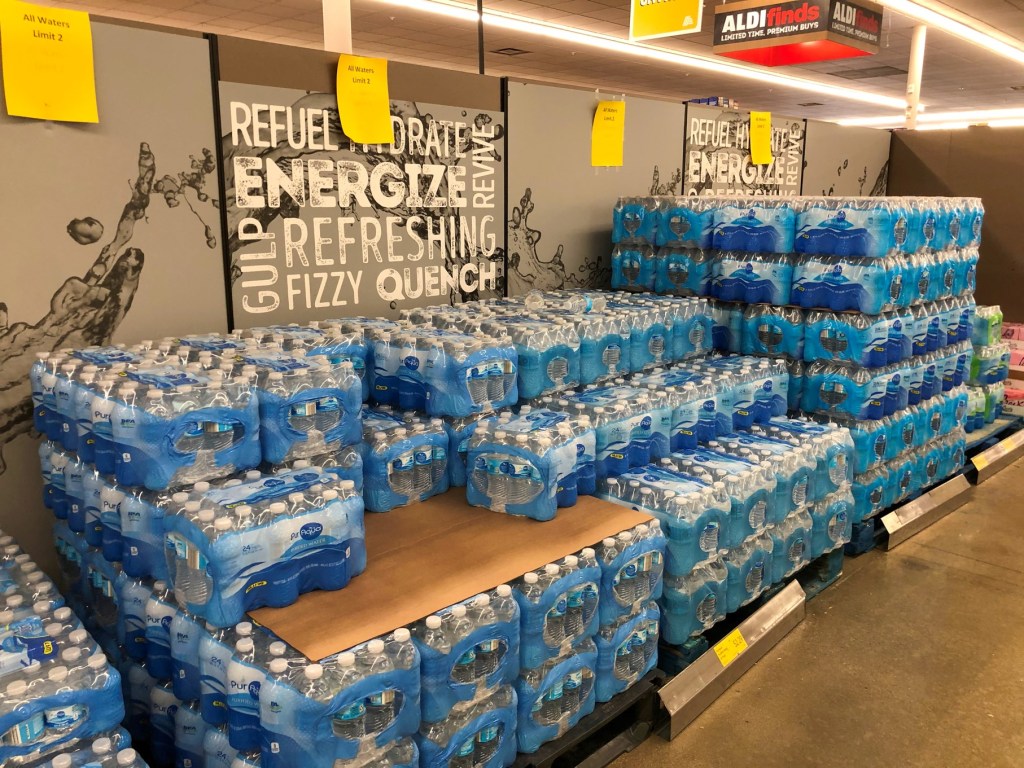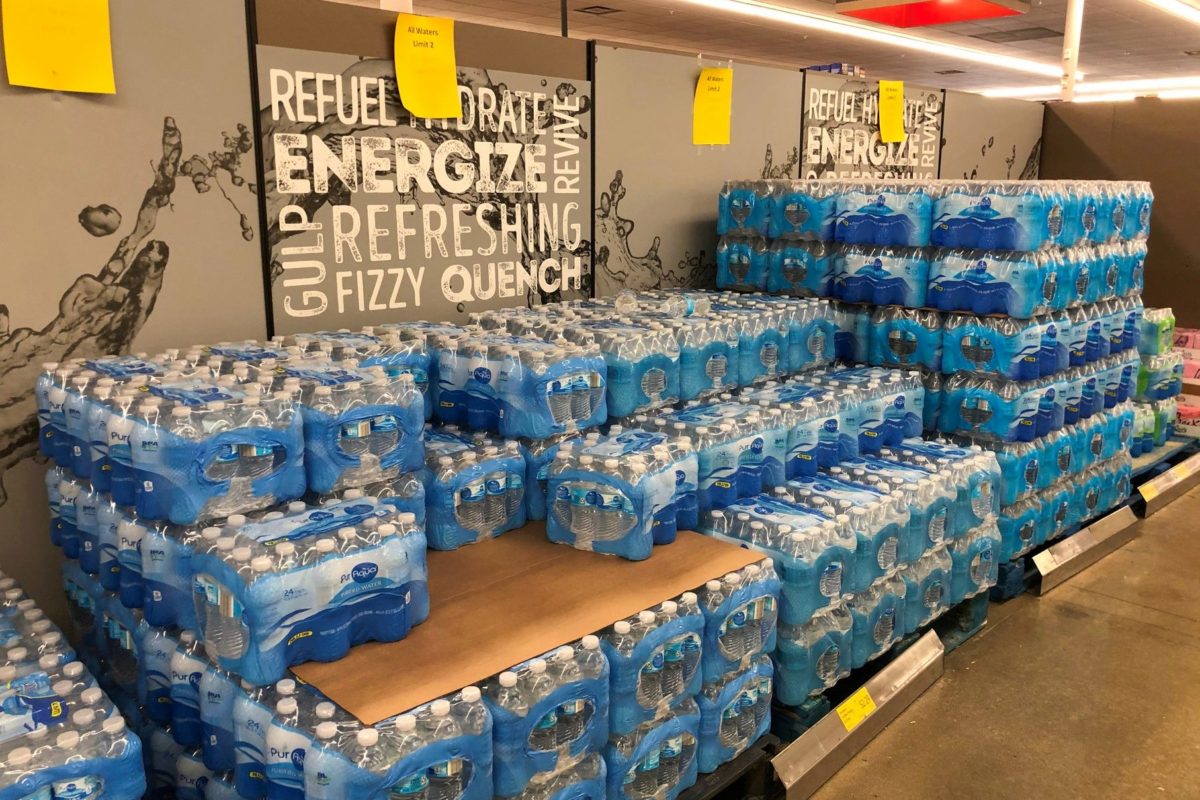The Jackson Water Crisis: Decades Of Disrepair, Disinvestment Frustrate Efforts To Restore Service In Mississippi

Source: Xinhua News Agency / Getty
It has been a long two weeks and counting for Arekia Bennett. Weeks after a vicious winter storm blew through the Gulf Coast, Bennett and other residents in Jackson, Mississippi, were still without water.
A resident of South Jackson, Bennett says water issues have happened before, but nothing like the current crisis.
“Ain’t like I’ve never been without water before,” Bennett told NewsOne in a recent interview. “I don’t think my family has gone over two or three days, three days max [without water].”
On Tuesday, Bennett traveled to her brother’s house in North Jackson to take advantage of his running water. She said depending on traffic, the commute can take her 40 minutes.
“I just don’t like bothering people,” Bennett explained. “So, I haven’t been over here as much.”
Water breaks are being repaired but Jackson, Mississippi is the only city in the state still struggling with water. @CBSNews’ @JanetShamlian followed up with residents – 82% of whom are black – struggling under a boiled water mandate for @CBSThisMorning pic.twitter.com/0Max6ZGC28
— Vladimir Duthiers (@vladduthiersCBS) March 3, 2021
As the lead for Mississippi Votes, Bennett is used to navigating tough situations. Founded in 2016, Mississippi Votes is a civic engagement organization committed to the state’s progression. The organization partnered in grassroot relief efforts immediately after the storms. She and her colleagues also raised funds to support student organizers and impacted staff at Mississippi Votes.
But Bennet said by last Sunday, the frustration caught up with her.
“Anybody that knows me knows I love Jackson,” Bennett explained. “I want to be here, but I think I’m the most frustrated I’ve ever been.”
She said her frustration, like many residents, was not an indictment of any particular city elected official. But such feelings should be expected considering the ongoing conditions.
A Series of Unfortunate Events
The combination of the unusually severe weather and an aging water system in serious disrepair has made it difficult to restore service.
Bennett recognizes the politics of the current situation and the ongoing dynamic between the overwhelmingly Black capital city and the majority white state leadership. She also cited the historical disinvestment in Jackson and other majority Black communities across the state. Jackson has a population that is 82% Black.
“Black folks in Jackson aren’t crazy,” Bennett said while explaining how many people know the current crisis is part of a larger issue that predates city leadership. “It is hard for that to be the centerpiece of the conversation because people’s material conditions are not being met.”
City Engineer Charles Williams Jr., Ph.D., said the city made some progress in its efforts but there was still much work ahead. In an email to NewsOne, Williams explained that the current crisis differed from past incidents given a combination of issues resulting from the winter storm.
“In this scenario the plant has major trouble bringing in raw water for treatment,” Williams wrote.
He said freezing temperatures led to several days of mechanical and electrical issues. A snowball effect, these issues led to trouble maintaining water pressure, which caused an outage affecting a majority of residents in Jackson as well as customers in the nearby city of Byram.
Williams also said that in the past three to five years, the city received two state revolving loans for roughly $20 million to make repairs on the water system. He estimated $15 million had been spent to date — a drop in the bucket compared to the overall estimated cost of replacing the aging system with a price tag in the billions.
In a Tuesday city council session, a question was raised concerning an inoperable booster station, which houses water pumps and pipes. Williams explained the city was working to address a prior compliance issue with the Mississippi Department of Health.
“We are submitting information regarding a corrosion control study for review and approval by the Mississippi Department of Health,” Williams told NewsOne.
Some council members suggested that part of any resolution to the issue should include an increased investment in the city’s Public Works Department. Williams told NewsOne that preventing this type of catastrophe required capital projects for both water distribution and water treatment facilities.
As of Tuesday night, the city had received reports of 99 water main breaks. Of those, 59 were repaired and another eight had been verified as actual water main breaks. The remaining 32 reported breaks were awaiting confirmation.
Not Only A Jackson Problem
Jackson isn’t the only part of Mississippi struggling without water. Danyelle Holmes, an organizer with the Mississippi Poor People’s Campaign, explained that several rural communities had similar difficulties but lacked the attention and support of Jackson.
“[This] is not just happening in Jackson,” said Holmes, who called the widespread infrastructure problems a failure of state government. “This is an issue with crumbling infrastructure across the state of Mississippi, not just in Jackson.”
Holmes added: “Rural communities were impacted and are not receiving any resources. Or [they] have not been fortunate to have community organizations to come in and push and get those resources to the rural areas.”
With more than 40 years in the state of Mississippi, and at least 20 years in the city of Jackson, Holmes said she had never seen anything like the current water crisis. Holmes said her organization provided support to folks in Claiborne County and its county seat Port Gibson. They dropped off non-potable water (for flushing) and bottled water to the area over the weekend.
Thousands of residents in Jackson, Mississippi have been without water for more than 2 weeks.
Jackson Mayor @ChokweALumumba updates @ZerlinaMaxwell on the ongoing crisis. pic.twitter.com/DwxGlbUC1g
— Zerlina on Peacock (@ZerlinaShow) March 3, 2021
Holmes also reported hearing of issues in several Mississippi Delta communities as well as the city of Belzoni and Tallahatchie County. Many of those areas have also been hard hit by the COVID-19 pandemic. Between Feb. 25 and March 1, several areas of Hind County, where Jackson is located, had their water determined to be safe to drink.
She said that not receiving a federal disaster declaration put a strain on those who are poor or with low wealth. “[People] are already struggling to survive during this pandemic, at no fault of their own, and many of these folks are part of the working class,” Holmes shared.
The winter storm further exacerbated things for many people, particularly those who may have missed income due to the storm. “That’s income that has been taken away from their household, on top of [everything else].”
Holmes sees a disparity in the communities allowed to go without a necessity like water. She said that other areas in the state had issues with their water system crashing but were back up and running without the same extended delay.
“We’re all taxpaying citizens of the state of Mississippi,” Holmes said. “We all deserve the same services, extended to us from our governor across the state.”
Bennett agreed.
“People in Jackson deserve the same type of regular response that you would give to a place like Oxford if they were without water for 10 days,” she said referencing the home of Ole Miss. “Because Oxford, Mississipp, will never be without water.”
Frustration is boiling over in Jackson, Mississippi, where the entire city has gone two weeks – two weeks – without safe drinking water. @CBSNews’ @JanetShamlian is there with the latest on the fallout from February’s deep freeze. pic.twitter.com/5xEnJkqqyQ
— Vladimir Duthiers (@vladduthiersCBS) March 2, 2021
Both Bennet and Holmes said the current situation drives home the reality of climate change.
“We understand and know that climate change is real,” Holmes said. “We have to better prepare our communities and start educating our communities on what is climate change, how it impacts our communities, and the effects that it has.”
Bennett said that consideration of the racial factors running through the current crisis and historic infrastructure disinvestment go along with thinking about climate justice.
“It’s gonna be important to start thinking equitably about our resources and how we’re prioritizing people in times of crisis,” reflected Bennett.
Anoa Changa is a movement journalist and retired attorney based in Atlanta. Follow Anoa on Instagram and Twitter @thewaywithanoa.
SEE ALSO:
Mississippi, Texas Lift COVID-19 Restrictions Placing Underserved Communities At Risk
Top Attorney Of Largest County In Texas Launches Investigation Into Power Outages
[ione_media_gallery id=”4094214″ overlay=”true”]

